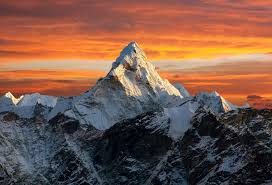
The Annapurna and Everest Luxury Lodge Trek is an gorgeous day out that combines the swish of each worlds the beautiful Annapurna and Everest areas of Nepal, alongside with the remedy of luxurious lodges.Then are the pivotal important points
Duration :20 days
Price:US$ 4200 per person
Stylish Seasons: March to May and September to November
Overview
This trip allows you to explore the majestic mountains of both the Everest base camp Trek and Annapurna regions while enjoying the modern conveniences of luxury lodges. Both the Annapurna and Everest have more length than other treks like Manaslu circuit trek and Langtang valley Trek .also’s a regard of what this trip entails.
Annapurna Region:
Day 1 appearance in Kathmandu and transfer to your hotel.
Day 2 Explore the ancient palaces and temples of Kathmandu.
Day 3 Fly to Pokhara and trip to Sanctuary Lodge( 3750 ft/ 1150 m).
Day 4 Trek to Himalaya Lodge near Ghandruk( 6600 ft/ 2000 m).
Day 5 Explore the surroundings from Himalaya Lodge.
Everest Region:
Day 6: Trek to Bee Village Lodge in Ghandruk (5415 ft/1565 m).
Day 7: Continue to Gurung Lodge in Majgaun (4620 ft/1400 m).
Day 8 Trek back to Pokhara( 2640 ft/ 830 m).
Day 9 Fly back to Kathmandu.
Everest Luxury Trek
Day 10 Fly to Lukla( 2845 m) and journey to Phakding.
Day 11 Trek to Namche Bazaar( 3440 m).
Day 12 adaptation day to explore Thamo or Syangboche.
Day 13 Trek to Thame( 3800 m).
Day 14 Trek to Kongde( 4250 m) with stunning views.
Day 15: Enjoy a day hike from Kongde.
Day 16: Trek back to Phakding (2610 m).
Day 17: Return to Lukla (2850 m).
Day 18: Fly back to Kathmandu.
Final Days:Day 19: Leisure day or reserve day in case of flight cancellations.
Day 20: Drive to the airport for your return flight.
Highlights:
Stay in luxury lodges with spectacular views of Everest and Annapurna.
Explore ancient palaces and temples in Kathmandu and Pokhara.
Altitude- related challenges:
Is a pivotal consideration when embarking on the Annapurna and Everest. Then there are some crucial points to keep in mind.
High Altitude:
As you lift, the oxygen situations drop significantly due to the thin air at advanced elevations. This can lead to symptoms of altitude sickness, similar as headaches, dizziness, nausea, and fatigue.
Proper adaptation is essential. The journey diary includes rest days to allow your body to acclimate gradationally to the altitude.
Altitude Sickness :Acute Mountain Sickness( AMS) can affect anyone, anyhow of fitness position or experience. It occurs when your body does n’t acclimatize well to the reduced oxygen situations.To minimize the riskStay doused .lift gradually.
Avoid alcohol and tobacco.
hear to your body and report any symptoms to your companion.
Challenging Terrain:The trails in both the Annapurna and Everest regions can be steep, rocky, and uneven. You ’ll hassle uphill and upward sections.
Touring poles can give stability and reduce strain on your knees.
Extreme WeatherWeather conditions can change fleetly, especially at advanced mound. Be set for unforeseen temperature drops, strong winds, and snow.
Dress in layers and carry applicable gear.
Altitude- Related Hazards
Crossing high suspense islands and narrow paths can be dispiriting.
Avalanche threat exists in certain areas, especially during downtime and spring.
Physical FitnessWhile the journey is designed for luxury, it still involves walking several hours each day. Good physical fitness is essential.
Regular exercise and cardiovascular training beforehand can help.
Exigency EvacuationIn case of severe altitude sickness or other extremities, evacuation by copter may be necessary. ensure you have trip insurance that covers similar situations.
Flash back that touring at high mound requires medication, caution, and respect for the mountains. Always follow your companion’s advice and prioritize safety. Enjoy the stirring views and the unique experience of being girdled by the Himalayan titans.
Difficulties on Annapurna and Everest
The Annapurna base camp Trek and Everest offers a mix of adventure and comfort, allowing you to explore the stunning Himalayan geographies while staying in luxurious lodges. Then are some of the challenges you might encounter during this remarkable journey
As you lift, the thin air at advanced elevations can lead to symptoms of altitude sickness, similar as headaches, dizziness, and fatigue.
Proper adaptation is pivotal. The journey diary includes rest days to help your body acclimate gradationally.
Altitude Sickness:Acute Mountain Sickness( AMS) can affect anyone, anyhow of fitness position or experience.
Challenging Terrain:The trails in both the Annapurna and Everest regions can be steep, rocky, and uneven.
touring poles can give stability and reduce strain on your knees.
Extreme Weather conditions can change fleetly, especially at advanced mound.
Be set for unforeseen temperature drops, strong winds, and snow.
Altitude- Related Hazards:Crossing high suspense islands and narrow paths can be dispiriting.
Avalanche threat exists in certain areas, especially during downtime and spring.
Physical Fitness:While the journey is designed for luxury, it still involves walking several hours each day.
Good physical fitness is essential.
Exigency Evacuation:In case of severe altitude sickness or other extremities, evacuation by copter may be necessary.
ensure you have trip insurance that covers similar situations.
Conclusion:
Flash back to follow your companion’s advice, prioritize safety, and enjoy the stirring views of the Himalayas.
Whether you ’re a seasoned mountaineer or a first- timekeeper, the Annapurna and Everest Trek promises an indelible adventure in the stage of the Himalayas
Write and Win: Participate in Creative writing Contest & International Essay Contest and win fabulous prizes.


